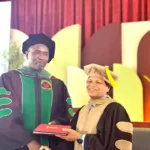President Emmerson Mnangagwa has abruptly terminated the tenure of Sithembiso Nyoni as Minister of Environment, Climate and Wildlife, effective immediately. The dismissal, delivered without any official explanation, has shaken political circles, raising questions about the future of Zimbabwe’s environmental policies and the President’s broader strategic objectives.
Nyoni, a veteran politician aged 75, had been a fixture in the cabinet since 2002, holding various ministerial portfolios. Prior to her appointment as Environment Minister in March last year, she served as Minister of Small and Medium Enterprises (SMEs), Minister for Women and Youth Affairs, and Minister of Industry and Commerce, among others. Her long service made her one of the most experienced members of the government.
The official announcement of Nyoni’s removal came via a letter from Chief Secretary to the President and Cabinet, Martin Rushwaya. The letter stated that “His Excellency the President of the Republic of Zimbabwe Cde Dr E D Mnangagwa, has in terms of section 340, subsection (1), paragraph (f), as read with section 108, subsection (1) paragraph (a) of the Constitution of Zimbabwe, removed Sithembiso Gile Gladys Nyoni from the position of Minister of Environment, Climate and Wildlife with immediate effect.”
While President Mnangagwa has remained silent on the reasons for Nyoni’s dismissal, speculation is rife. Some political analysts suggest that the move is part of a wider series of strategic appointments designed to consolidate the President’s power and potentially pave the way for an extension of his term beyond the constitutional limit of 2028. However, Mnangagwa has publicly dismissed any intention of remaining in power beyond his current term.
Government sources, speaking anonymously, have hinted at the possibility of factional battles within the ruling Zanu-PF party as a contributing factor. These sources suggest that tensions between allies of President Mnangagwa and Vice President Constantino Chiwenga may be playing a role in the recent cabinet reshuffle, although this remains unconfirmed.
Nyoni’s dismissal comes at a particularly sensitive time for Zimbabwe’s environmental sector. The country faces significant climate challenges, and the Ministry of Environment, Climate and Wildlife plays a crucial role in addressing these issues. The President’s office has not yet announced Nyoni’s replacement, leaving uncertainty about the future direction of the nation’s environmental policy.
Adding to the complexity, Nyoni’s time as Environment Minister was marked by several controversies. One notable incident involved a clash between the Zimbabwe Parks and Wildlife Management Authority (ZimParks), which fell under her purview, and the Ministry of Mines and mining development. The dispute arose after the Ministry of Mines granted a Chinese mining company, Sunny Yi Feng (Private) Limited, an exclusive coal prospecting licence within the Hwange National Park.
ZimParks strongly opposed the decision, arguing that the proposed mining project targeted the Sinamatella Black Rhino Intensive Protection Zone, a critical habitat for the endangered black rhino species. ZimParks spokesperson Tinashe Farawo issued a statement expressing grave concerns about the potential impact on the rhino population.
“Needless to mention that the proposed mining project will actually increase the risk of species extinction and prospects of population recovery will be negatively affected,” Farawo said. He further warned that “approving mining in this zone would not only contradict ZimParks’ conservation mandate but also tarnish Zimbabwe’s reputation regionally and internationally as a world leader in sustainable conservation.”
Farawo also highlighted the broader environmental implications of the mining project, stating that “the proposed mining project poses a significant threat, worsening the degradation of land, a critical concern for ZimParks, which has a mandate to ensure that at least 30% of degraded terrestrial, inland water and ecosystems are restored by 2030.” Hwange residents have also voiced similar concerns, fearing the impact on the park’s ecosystem and the local tourism industry.
Another incident that occurred during Nyoni’s tenure involved a Chinese company that allegedly duped the Environmental Management Agency (EMA) which also reports to the Ministry of Environment. The company, called Friends of the Environment, entered into a partnership with EMA to close open pits left by artisanal miners in the Umzingwane River. However, it was later discovered that the company was engaging in riverbed mining under the guise of environmental rehabilitation.
Tafadzwa Muguti, the secretary for presidential affairs and devolution in the president’s office, revealed the details of the incident during a visit to the catchment areas of major dams in Matabeleland South. He stated that “We had a Chinese company here, Friends of the Environment, who partnered with EMA and the province later found out that by day they were closing the pits in the name of Friends of the Environment and by night they were mining.”
Muguti further explained that the company’s activities had caused significant damage to a bridge at the confluence of the Umzingwane and Inyankuni rivers, contributing to poor inflows into major dams that supply Bulawayo with water. “They destroyed a whole bridge while looking for gold,” Muguti said, adding that “this is almost a 150-meter bridge which was destroyed completely in the name of mining. This is Umzingwane River, it supplies water to Bulawayo and the collapse of this bridge is causing water challenges as the water has stopped flowing.”
EMA terminated the partnership with Friends of the Environment, but it remains unclear whether any individuals were prosecuted for their involvement in the alleged deception. The incident has highlighted the challenges of regulating mining activities and protecting the environment in Zimbabwe.
Nyoni’s career has spanned both the non-governmental and governmental sectors. Before joining the government, she founded the Organisation of Rural Associations for Progress (ORAP) in 1981 and remains its president. ORAP is a non-governmental organisation that focuses on rural development and empowerment.
The Ministry of Environment, Climate and Wildlife is a crucial government body responsible for environmental management, climate change mitigation, and wildlife conservation in Zimbabwe. The Ministry oversees several key agencies, including the Zimbabwe Parks and Wildlife Management Authority, the Environmental Management Agency, the Forestry Commission, and the Meteorological Services Department of Zimbabwe.

Follow @MyZimbabweNews













